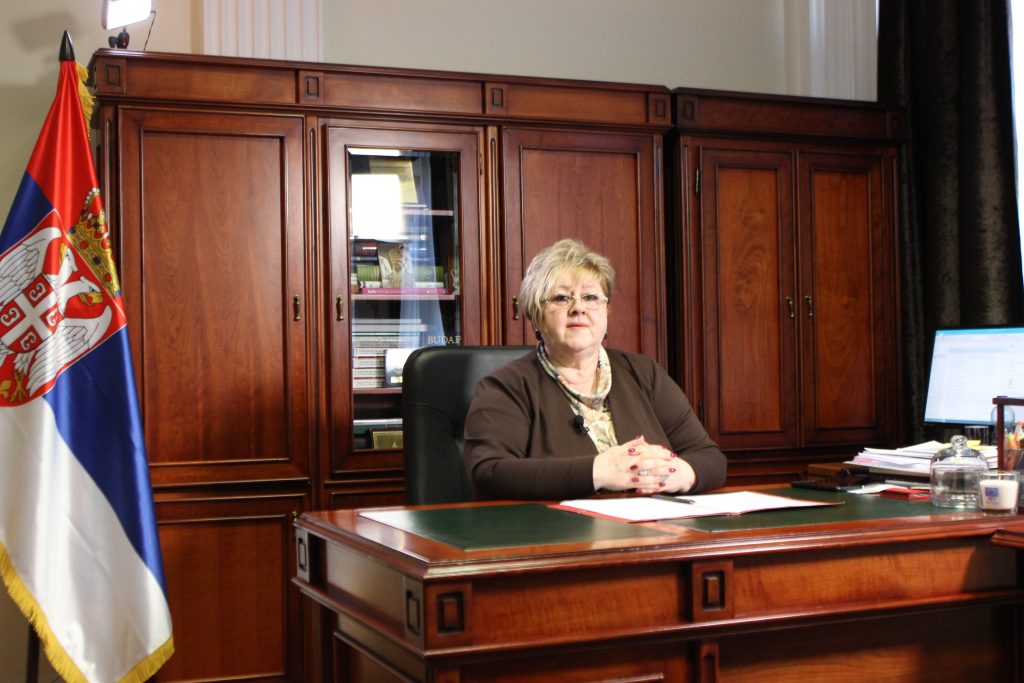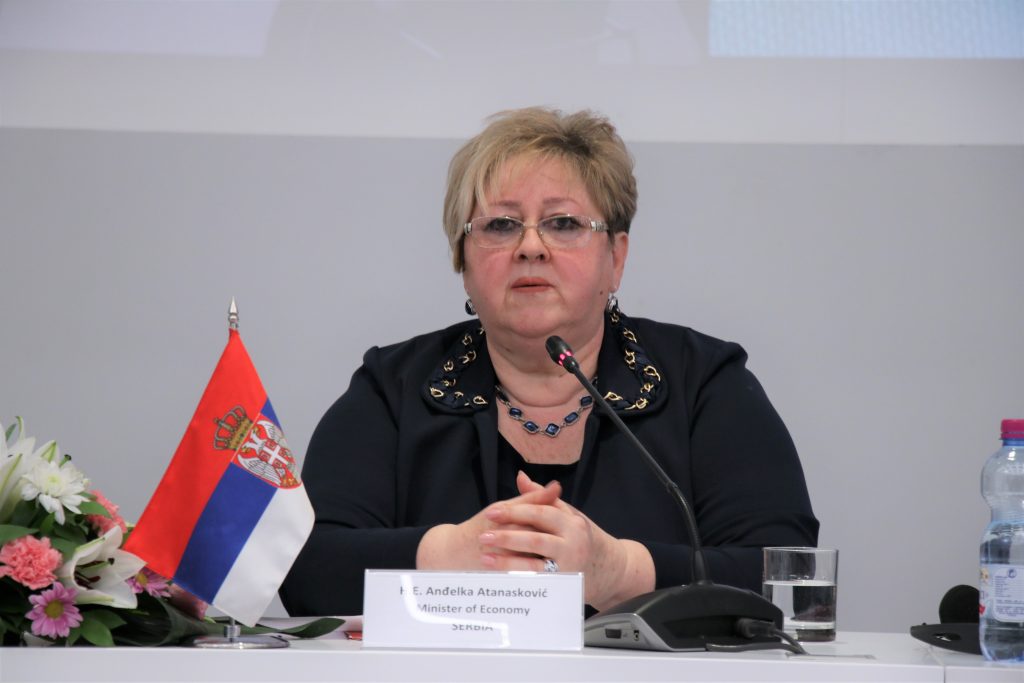Economic indicators show that our country is politically and economically stable today, has international credibility, is attractive for new investments and brimming with opportunities and possibilities
Last year was very challenging for all economies worldwide. In order to mitigate the negative consequences caused by the coronavirus and preserve the stability of the financial and economic system, the Government of Serbia has been supporting companies in maintaining their business operations. We talked with the Minister of Economy, Andjelka Atanasković, about the implemented measures and current projects and competitions.

You became the Minister of Economy during the biggest health crisis. How did the coronavirus affect the Serbian economy?
We have managed to preserve the Serbian economy despite all the challenges. Just like global economies, we also had to face risks and uncertainties due to the Covid-19 epidemic. Thanks to the responsible actions of the Government of Serbia and the policy of President Aleksandar Vučić, we have been supporting the economy and businesses thanks to the proper economic measures and considering that our economic indicators are excellent, we can now calmly wait for the end of the pandemic. We ended last year with the lowest GDP decline in Europe, while in the region, we have had the highest GDP growth for quite some time. We are more than satisfied with the results achieved at the beginning of 2021, namely, a 1.2% growth of the national GDP in the first quarter and we now have economic results that are parallel to those from the first quarter of the previous year, which is promising because we will overcome the problem faster and simpler, as well as eliminate the possible consequences of the crisis caused by the pandemic much quicker.
How would you rate economic development in Serbia today?
Economic indicators show that our country is politically and economically stable today, has international credibility, is attractive for new investments and brimming with opportunities and possibilities. Our optimism is based on reality, which has been validated by the European Commission and the International Monetary Fund’s forecasts, which predict Serbia having greater resilience and growth in the current global crisis than other countries. We have ensured the vitality of our economy and the liquidity of companies while preventing factory closures, thanks to the state’s adequate response and financial support packages.
This year, 17.6 billion dinars from the state budget was allocated to the economy. How will you distribute that money and what will be your main focus?
Just over 15 billion dinars has been set aside for incentives for direct investments, 2 billion dinars has been set aside for several support programmes for SMEs and entrepreneurship, while a total of 1.6 billion dinars of budget funds will go towards infrastructure projects and regional development measures.
What other projects/programmes do you plan to implement this year? Apart from state funds, how else do you support businesses?
As I mentioned earlier, this year, we have allocated a total of 2 billion dinars in grants under the auspices of four support programmes for small and medium-sized enterprises for purchase of equipment, encouraging entrepreneurship through development projects, helping beginners in business and, for the first time, for the women and youth programme. The Ministry has also set aside 1.55 billion dinars in grants for the Small and Medium-Sized Enterprise Support Programme for the Procurement of Equipment in 2021, 200 million dinars for the Entrepreneurship Encouragement Programme with Development Projects, and 150 million dinars for beginners in the business.
There are also programmes implemented by the Development Agency of Serbia (RAS):
– Programme for entering the supply chains of multinational companies intended for automotive companies.
– Micro- and SME-export promotion programme intended for companies from the food and wood industry sector (furniture production).
“Our goals are improving the economic environment and creating an even better economic climate in Serbia”
I should also mention the reimbursement of 50% of the costs for participation in international trade fairs.
Plus, there are also advisory services and training sessions for cooperatives, clusters and micro enterprises and SMEs, both future and existing. Also, with the help of regional development agencies, cooperatives and clusters can use a set of standard services free of charge – from obtaining information and training to advisory services, mentoring, promotion and field supervision of their business operations.
It is also important to mention that the Development Fund set aside the amount of 3.5 billion dinars (from its own funds) for 2021. Furthermore, in cooperation with the Ministry of Economy, and under the auspices of development project support programme and programme that supports beginners in business, the Fund also plans to allocate 450 million dinars worth of grants. This is in addition to the Fund’s loans.
Additionally, the Serbian government and the European Investment Bank (EIB) have recently concluded a 200-million-euro financing agreement. The programme that will be financed with this money is envisaged as the Government’s support to small and medium-sized enterprises affected by the COVID-19 pandemic. Thus, when we add all of the aforementioned funds up, we come to the figure of 19.2 billion dinars that will be allocated via the Fund in 2021.
We are talking about extremely favourable loans, never before granted in our country. They are long-term loans with an affordable interest rate.
Public competitions are open until the available funds are used up, but no later than December 31 this year. You can find all information and required documentation on the official website of the Ministry of Economy and the Development Fund.
When it comes to EU funds for businesses, I would like to mention two programmes:
• Horizon Europe, an EU programme that funds innovative business ideas for SMEs. The programme’s total budget stands at 100 billion euros, and the best projects will be financed regardless of which country they come from.
• WB EDIF (The Western Balkans Enterprise Development and Innovation Facility) has secured over 300 million euros of direct financing for the SME sector in the region.
I would also like to single out FINNO, a new online platform for business development of companies from the region, which provides SMEs with complete information on available sources of funding from European and regional funds and financial support programmes.

In cooperation with the business sector, the Ministry of Economy has successfully implemented 177 investments. What contributed to Serbia becoming the desired investment location?
Since the Law on Investments entered into force to date or during the past five-year investment period, in cooperation with the business sector, the Ministry of Economy has awarded incentives and successfully implemented 177 investments worth 158 billion dinars (about 1.35 billion euros). As a result, over 50,000 people found jobs in 78 municipalities in which these investments were made. As for ongoing projects, i.e. those investments that we are currently realizing, 113 projects pertain to new technologies and require even bigger capital investments, worth a total of 350 billion dinars.
On a global economic scale, Serbia is now seen as an appealing investment location and today, foreign investors choose Serbia to invest in. We have achieved this with overall stability and by insisting on the fact that economic development is based on investment policy. The good relations that President Aleksandar Vučić has with the leaders of the superpowers and his commitment create new opportunities and chances every day for even greater growth and development of our economy.
Recently, the Minister of Finance, Siniša Mali, and the Vice President of the European Investment Bank (EIB), Lilyana Pavlova, signed an important financial agreement. How will this contribute to the economic recovery of our country and who will be the beneficiaries of these funds?
The European Investment Bank (EIB), the bank of the European Union, will provide a loan of 200 million euros to the Development Fund of the Republic of Serbia that will be used towards the faster recovery of small and medium-sized enterprises (SMEs) and medium market capitalization companies from the consequences caused by Covid-19.
“This year, 17.6 billion dinars from the state budget was allocated for business incentives”
This is the sixth EIB loan for Serbia under the auspices of the financial package of Team Europe for the Western Balkans, which brings the total amount of EIB support for faster recovery of Serbia from Covid-19 to 380 million euros. The loan will expedite the recovery of the private sector, boost economic activity and help preserve over 47,000 jobs while creating 5,500 new employment opportunities for Serbian citizens. With the help of the EIB, this project will contribute to the recovery and development of SMEs by supporting new investments, preserving jobs, encouraging economic development based on the principles of sustainable development and improve competitiveness through investments in digitization and the application of new technologies.
What are your further plans for improving and developing the country’s economy?
Improving the economic environment and creating an even better economic climate in Serbia are the goals that my team and I have been working hard to achieve. We want to equally develop all parts of Serbia, to open as many factories as possible, to provide new jobs, to invest in infrastructure projects and to work on improving the standard of living in order to provide our children with a better future.